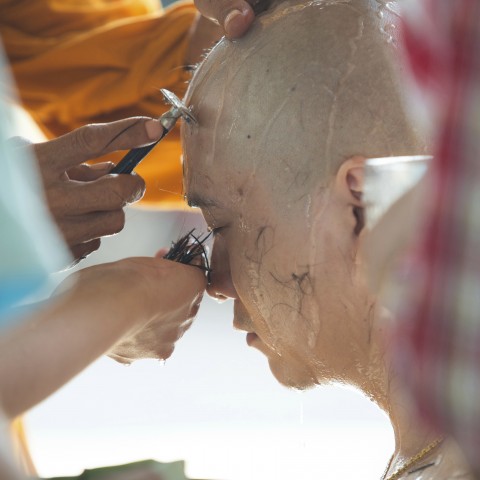Those who have been to many countries are likely to know that people, despite being the same in many aspects, are different because of culture, customs, and values. Everyone has to eat, sleep, and interact with other people. So how do these actions differ in Thailand, compared to elsewhere?
If you need to interact with Thai people or plan on living in Thailand, knowing about Thailand customs, culture facts, social values, beliefs, and traditions is essential. To fit in with the rest of the Thai population and show respect, you need to know about them, especially Thai culture and etiquette.
In this article, ThaiPod101.com will teach you about Thai etiquette in daily life situations, such as Thai eating etiquette, Thai funeral etiquette, Thai business etiquette, and Thai etiquette for tourists, so you know all the do’s and don’ts in Thailand. Moreover, you’ll get to know more about tradition and culture in Thailand through this lesson.
Table of Contents
- Words about Thai Customs
- Useful Sentence Patterns to Discuss General Etiquette in Thailand
- Thai Dining Etiquette
- Manners and Etiquette in Thailand: Thai Tourist Etiquette
- Thai Greeting Etiquette
- Thai Guest Etiquette
- Thai Etiquette in Public Transportation
- Thai Business Etiquette
- Thai Etiquette in Various Situations
- Conclusion: How ThaiPod101 Can Help You Master Thai Culture
1. Words about Thai Customs
Before you learn about Thai customs, it will be good to know Thai words related to this topic.
- ขนบธรรมเนียมไทย (khà-nòp-tham-niiam thai) is “Thai custom” or “Thai tradition”
- มารยาทไทย (maa-rá-yàat thai) is “Thai etiquette” or “Thai manners”
- วัฒนธรรมไทย (wát-thá-ná-tham thai) is “Thai culture“
- ความเชื่อไทย (khwaam-chûuea thai) is “Thai belief”
- ค่านิยมไทย (khâa-ní-yom thai) is “Thai value”
- สังคมไทย (sǎng-khom thai) is “Thai society”
2. Useful Sentence Patterns to Discuss General Etiquette in Thailand
Let’s learn the sentence patterns you should know when you talk about Thai etiquette and manners. There are two patterns as listed below:
1- Should…
Thai language: ควร + verb
Thai pronunciation: khuuan + …..
Example:
- แขกควรถอดรองเท้าก่อนเข้าบ้านคนไทย
khàaek khuuan thàawt raawng-tháo gàawn khâo bâan khon thai
“Guests should take off their shoes before entering a Thai house.”
2- Don’t…
Thai language: อย่า + verb
Thai pronunciation: yàa + …..
Example:
- อย่าจับหัวคนไทยโดยไม่จำเป็น
yàa jàp hŭua khon thai dooi mâi jam bpen
“Don’t touch the head of a Thai person unless it’s necessary.”
3. Thai Dining Etiquette
Since eating is part of daily life, we’ll first teach you Thai table manners and dining etiquette in Thailand. Below is a list of things you should and shouldn’t do during a meal with Thai people. As long as you follow these basic rules of eating etiquette in Thailand, you should have a very enjoyable Thai meal.
1- Let elders or people of a higher position eat first.
Thai sentence: ให้คนที่อายุมากกว่าหรือมีตำแหน่งสูงกว่าตักอาหารก่อน
Thai pronunciation: hâi khon thîi aa-yú mâak gwàa rǔue mii dtam-nàaeng sǔung gwàa dtàk aa-hăan gàawn
Explanation: In Thai society, people normally eat together as a big family. Each person has their own plate of rice, but shares side dishes with each other. It’s proper table etiquette in Thailand to let people who are older than you, or people who are in a higher position than you (such as your boss), start eating first. This means that they can pick food from the side dishes first.
2- Set the table for elders.
Thai sentence: จัดโต๊ะอาหารให้คนมีที่อายุมากกว่า
Thai pronunciation: jàt dtó aa-hǎan hâi khon thîi mii aa-yú mâak khwàa
Explanation: As mentioned above, people in Thai society normally eat together. In case the dining table isn’t properly set, the youngest one at the table should be the one who sets it.
3- Don’t speak while chewing.
Thai sentence: อย่าพูดตอนเคี้ยวอาหาร
Thai pronunciation: yàa phûut dtaawn khíiao aa-hǎan
Explanation: Speaking while chewing is considered bad restaurant etiquette in Thailand, and is rude for dining in general. Apart from not looking nice and other people not clearly understanding what’s said, this behavior may make the speaker choke on food. So you shouldn’t do this while dining with Thai people.
4- Don’t make noise when chewing or drinking.
Thai sentence: อย่าทานอาหารหรือดื่มน้ำเสียงดัง
Thai pronunciation: yàa thaan aa-hǎan rǔue dùuem nám sǐiang dang
Explanation: In some countries, making noise when eating shows that you enjoy the food. But in Thailand, it’s viewed as bad etiquette. When you eat in Thailand, avoid making loud noises while eating or drinking.
5- Don’t hit tableware.
Thai sentence: อย่าเคาะช้อนส้อม
Thai pronunciation: yàa kháw cháawn sâawm
Explanation: In the phrase above, its literal meaning only mentions spoons and forks. But actually, Thai people consider hitting all tableware items (such as spoons, forks, chopsticks, etc.) as rude.
6- Don’t talk about gross topics.
Thai sentence: อย่าคุยเรื่องน่าขยะแขยง
Thai pronunciation: yàa khui rûueang nâa khà-yà-khà-yǎaeng
Explanation: During the meal, you shouldn’t talk about something gross, as it will make others lose their appetite.
4. Manners and Etiquette in Thailand: Thai Tourist Etiquette
Thailand is a nice place for traveling. There are many beautiful places to go sightseeing, the food tastes good, and Thai people are very nice. Moreover, the cost of living here isn’t high, so a lot of people enjoy traveling in Thailand.
As a tourist, it’s good to know some Thai manners and customs so that you don’t unintentionally act weird or rude in Thais’ point of view. To help you understand basic social etiquette in Thailand, we’ve provided a list of proper tourist etiquette in Thailand.
There are two main scenarios that we’ll focus on in this section: Basic etiquette in Thailand while in public areas, and how to act in holy places.
1- Thai Etiquette in Public Areas
Sightseeing is a must when you come to Thailand. Most tourists enjoy street food, shopping in the night market, or just seeing around the city. So it’s nice to know what you should and shouldn’t do.
1. No public displays of affection.
Thai sentence: อย่าแสดงความรักในที่สาธารณะมากจนเกินไป
Thai pronunciation: yàa sà-daaeng khwaam-rák nai thîi sǎa-thaa-raa-ná mâak jon gooen bpai
Explanation: In Thai society, some displays of affection between lovers is acceptable, such as holding hands or hugging. But any behavior more than this, such as kissing, isn’t okay. Thai people see it as inappropriate. But displays of affection between parent and child is okay.
2. Be aware not to touch a monk if you’re female.
Thai sentence: ผู้หญิงต้องระวังอย่าให้โดนตัวพระ
Thai pronunciation: phûu-yǐng dtâawng rá-wang yàa hâi doon dtuua phrá
Explanation: Most Thai people are Buddhist, and in Thailand, beliefs and values of Buddhism are quite strong. It’s possible that you may see a monk walking by on the street. For a monk, there’s a rule saying that monks can’t touch a female, regardless of intention.
So if you see a Thai monk, and you’re a female, please uphold proper etiquette in Thailand and avoid being too close; you don’t want to accidentally touch the monk. If you’re walking in a crowded street and don’t know what to do, just stop walking and the monk will avoid you instead.
3. Stand still when you hear the Thai national anthem.
Thai sentence: ยืนตรงเคารพธงชาติ
Thai pronunciation: yuuen dtrong khao-róp thong-châat
Explanation: In some public areas, such as parks, you may hear the Thai national anthem at eight o’clock in the morning and again at six o’clock in the afternoon. When Thai people hear the national anthem, they stand still until the song ends, as a way to pay respect. So if you notice that Thai people have suddenly stopped walking and stand still at these times, it’s probably because of the national anthem.
4. Avoid dressing too short or too sexy.
Thai sentence: อย่าแต่งตัวโป๊
Thai pronunciation: yàa dtàaeng dtuua bpóo
Explanation: In Thailand, values and traditions for women may have changed a lot from the past, but women are still expected to dress properly when going outside. That is, don’t wear short-shorts or short skirts. Not wearing a bra is unacceptable as well. The customs and etiquette in Thailand for men’s dress isn’t as strict as it is for women; just dress with consideration for where you’ll be going.
2. Thai Etiquette in Holy Places
If you come to Thailand, one of the most famous tourist attractions are temples. Temples are viewed as holy places in Thailand, so you’re expected to follow certain cultural etiquette in Thailand when you’re in the temple. Here’s a list of do’s and don’ts for etiquette in Thai temples.
1. Dress properly.
Thai sentence: แต่งกายเรียบร้อย
Thai pronunciation: dtàaeng-gaai rîiap-ráauy
Explanation: It is the etiquette of Thailand to dress properly in the temple, both men and women. A shirt with no sleeves, shorts, and skirts that are shorter than knee-length aren’t appropriate to wear in temples. So if you plan to travel to a temple, please dress properly.
2.Don’t make loud noise.
Thai sentence: อย่าส่งเสียงดัง
Thai pronunciation: yàa sòng sǐiang dang
Explanation: Adding to what we mentioned above, temples are also a place where people come to make merit and practice dharma. Thus, temples normally have a calm atmosphere; you shouldn’t make loud noises in the temple.
3. No alcohol or cigarettes.
Thai sentence: ห้ามดื่มเหล้าและสูบบุหรี่
Thai pronunciation: hâam dùuem lâo láe sùup bù-rìi
Explanation: For Buddhists, there’s a behavior guideline called ศีล 5 (sǐin-hâa) which means “5 precepts.” Drinking alcohol and smoking are prohibited behaviors in these five precepts. So you can’t drink or smoke in the temple area. Also keep in mind that drinking and smoking are unhealthy as well.
4. Take off your shoes where required.
Thai sentence: ถอดรองเท้าในบริเวณที่กำหนด
Thai pronunciation: thàawt raawng-tháo nai baaw-rí-ween thîi gam-nòt
Explanation: In some areas, such as in the chapel, you have to take your shoes off. There will be a sign that clearly shows if you have to take your shoes off.
5. Do not take photos.
Thai sentence: ห้ามถ่ายรูป
Thai pronunciation: hâam thàai rûup
Explanation: In some areas of the temple, you’re not allowed to take photos. There will be a sign clearly showing if you’re not allowed to take photos, so please look around.
5. Thai Greeting Etiquette
Our guide of etiquette rules in Thailand wouldn’t be complete without a section on proper greetings.
When people meet, people greet. So if you come to Thailand, it makes sense to learn Thai greeting etiquette. Greetings reflect another unique aspect of culture and etiquette in Thailand, and we’ll explain the main points of greeting etiquette in Thailand as follows:
1- Say sà-wàt-dii + wâi
When Thai people meet each other, they greet by saying สวัสดี (sà-wàt-dii) and perform an action called ไหว้ (wâi). Let’s learn some vocabulary before continuing.
- ไหว้ (wâi) is a way of greeting in Thai language.
- สวัสดี (sà-wàt-dii) is “hello” in Thai. The word “hello” in Thai means goodness, beauty, prosperity, and safety.
To ไหว้ (wâi), you have to put your hands together in front of your chest and bend your head toward your forefinger.
2- Smile
Thai sentence: ยิ้ม
Thai pronunciation: yím
Explanation: If you’re not Thai or can’t speak much Thai, just smile after greeting. It creates a good atmosphere when you meet someone. As you may have heard before, Thailand is a land of smiles.
3- Call Other Parties by kun+name
When you meet someone for the first time, it’s formal to call them by คุณ (khun) + name. คุณ (khun) is a formal title in Thai.
4- Avoid Looking at Other Parties from Head to Toe
Thai sentence: อย่ามองคนจากหัวจรดเท้า
Thai pronunciation: yàa maawng khon jàak hǔua jà-ròt tháo
Explanation: Looking at other parties from head to toe isn’t exactly a rude gesture. However, some people do this action as a way of looking down on other people, so it may create the wrong impression if you do so.
6. Thai Guest Etiquette
When you come to Thailand, you may get a chance to visit a Thai house. Thus, it will be good to learn some Thai hospitality and etiquette so that you know what you can and can’t do, and act accordingly.
1- Take Off Your Shoes Before Entering the House
Thai sentence: ถอดรองเท้าก่อนเข้าบ้าน
Thai pronunciation: thàawt raawng-tháo gàawn khâo bâan
Explanation: Most Thai people walk barefoot in the house. So if you visit a Thai house, you have to take off your shoes before entering the house.
2- Stay in the Living Room
Thai sentence: อยู่ในห้องนั่งเล่น
Thai pronunciation: yùu nai hâawng nâng lên
Explanation: When you go to another person’s house, if you’re not close to the owner, it’s appropriate to stay mainly in the living room or in the area where the owner seated you. You shouldn’t go wandering by yourself. However, this also depends on the relationship between you and the owner.
3- Bring a Gift (though it’s not Necessary)
Thai sentence: เอาของมาฝากเจ้าของบ้าน
Thai pronunciation: ao khǎawng maa fàak jâo khǎawng bâan
Explanation: When you visit a Thai house, it would be nice to bring some kind of gift to them. Most of the time, when it comes to gift etiquette in Thailand, food and drinks are okay. It doesn’t have to be anything fancy. Again, what’s considered proper gift giving etiquette in Thailand also depends on the relationship between you and the owner of the house.
4- Avoid Putting Your Feet on the Table
Thai sentence: อย่าเอาเท้าวางบนโต๊ะ
Thai pronunciation: yàa ao tháo waang bon dtó
Explanation: Thai people view feet as being dirty. Thus, you shouldn’t put your feet on the tables or chairs.
5- Don’t Go into the Owner’s Belongings
Thai sentence: อย่ารื้อของในบ้านคนอื่น
Thai pronunciation: yàa rúue khǎawng nai bâan khon ùuen
Explanation: Even if you have a close relationship with the owner of the house, it may be inappropriate to look through things in drawers or cupboards. Things in those areas are kind of personal, but if the owner asks you to open it, then it’s okay.
7. Thai Etiquette in Public Transportation
When you travel in Thailand, you may get a chance to travel by public transportation, such as on a bus, BTS, MRT, etc. Here are the do’s and don’ts for transportation in Thailand that you should know.
1- Don’t Stand in Front of the Door
Thai sentence: อย่ายืนขวางประตู
Thai pronunciation: yàa yuuen khwǎang bprà-dtuu
Explanation: When you travel by bus, BTS, or MRT, try to get inside so that there’s space for others to come in. Avoid standing in front of the door, as this is dangerous and could lead to an accident.
2- Give Your Seat to Children, Monks, Elders, and Handicapped People
Thai sentence: เอื้อเฟื้อที่นั่งแก่เด็ก, พระ, คนชรา, และคนพิการ
Thai pronunciation: ûuea-fúuea thîi nâng gàae dèk phrá khon chá-raa láe khon phí-gaan
Explanation: Thai people are quite kind and often help each other. Thai people view children, elders, and handicapped people as physically inferior and in need of help. As for monks, Thai people respect them. So when traveling by public transportation, Thai people give their seats to them. It’s not a social norm, but it’s what Thai people often do anyways.
3- No Alcohol or Cigarettes
Thai sentence: ห้ามดื่มเหล้าและสูบบุหรี่
Thai pronunciation: hâam dùuem lâo láe sùup bù-rìi
Explanation: Alcohol affects how people think, and cigarette smoke is unhealthy. As they’re not good to others and could lead to accidents and problems, you shouldn’t drink or smoke on public transportation.
4- No Stinky Food
Thai sentence: อย่านำอาหารมีกลิ่นขึ้นรถ
Thai pronunciation: yàa nam aa-hǎan mii glìn khûen rót
Explanation: Some food—such as durians, crispy garlic chive dumplings, and squid—can be very stinky. While some people think these foods smell nice, others don’t. To create a nice and clean atmosphere and not disturb other people, don’t eat stinky food on public transportation. If you have to bring it with you, make sure to seal it properly so it doesn’t smell much.
8. Thai Business Etiquette
If you’re working in Thailand or working with Thai people, it’s nice to know business etiquette in Thailand. Below are some things about business etiquette in Thailand you should be aware of.
1- Dress Properly
Thai sentence: แต่งตัวสุภาพ
Thai pronunciation: dtàaeng-dtuua sù-phâap
Explanation: The first impression is very important when you do Thai business. And the first thing that catches attention is how you dress. Men are supposed to wear a shirt and slacks, while women are supposed to wear a knee-length dress or a shirt with a skirt. The tone of the clothing shouldn’t be too colorful, and no sandals.
2- Address Other Parties Formally
Thai sentence: เรียกอีกฝ่ายอย่างสุภาพ
Thai pronunciation: rîiak ìik fàai yàang sù-phâap
Explanation: The formal way to address each other in Thai is by saying คุณ (khun) + name. คุณ (khun) is a formal title in Thai.
3- Greet Other Parties Formally
Thai sentence: ทักทายอีกฝ่ายอย่างสุภาพ
Thai pronunciation: thák-thaai ìik fàai yàang sù-phâap
Explanation: When you meet your business partner, you should first greet them by saying สวัสดี (sà-wàt-dii) and perform ไหว้ (wâi).
4- Be Punctual
Thai sentence: ตรงเวลา
Thai pronunciation: dtrong wee-laa
Explanation: This one is quite common; don’t make others wait for you. In Bangkok, the traffic is quite bad, so make sure you have a lot of time for traveling.
5- Shaking Your Foot or Leg
Thai sentence: อย่านั่งเขย่าขา
Thai pronunciation: yàa nâng khà-yào khǎa
Explanation: Some people have a habit of shaking their foot or leg when sitting for a long time. It isn’t a rude manner in Thailand, but it makes you look unprofessional.
6- Avoid Putting Your Feet on the Table
Thai sentence: อย่าเอาเท้าวางบนโต๊ะ
Thai pronunciation: yàa ao tháo waang bon dtó
Explanation: As mentioned above, Thai people consider feet to be dirty. Thus, you shouldn’t put your feet on tables or chairs. It’s considered rude manners.
7- Avoid Chewing Gum
Thai sentence: อย่าเคี้ยวหมากฝรั่ง
Thai pronunciation: yàa khíiao màak-fà-ràng
Explanation: Chewing gum while speaking is unprofessional behavior for Thai people.
9. Thai Etiquette in Various Situations
If you live or work in Thailand, you may be invited to a ceremony for your friends or colleagues. In order for you to act appropriately and be nice to the host, here are the things you should know.
1- Thai Etiquette in Wedding Ceremonies
If you’re quite close to a Thai person, you normally get invited to their wedding ceremony. Normally, when you arrive to the ceremony, you should go to see the bride and groom to congratulate them before taking photos with them. Then, go sit in your assigned place. After this, just celebrate along with everyone.
However, you may not be sure how you should act or dress, as people in different countries have different cultures. For Thai people, you should follow these tips.
1. Wear light-toned clothing.
Thai sentence: ใส่เสื้อผ้าสีอ่อน
Thai pronunciation: sài sûuea-phâa sǐi àawn
Explanation: For women, in case there’s no theme, wear light-toned clothing. If there is a theme, dress according to the theme. Don’t dress in white, as Thai people think only the bride should dress in white for the wedding ceremony. Don’t dress in black either, as Thai people wear black to funerals.
For men, dressing for a wedding is quite easy. Men normally wear a suit to the wedding. Any color is fine; just make sure it’s not too colorful. If there’s a theme, dress according to it.
2. Give money to the bride and groom.
Thai sentence: ใส่ซองให้บ่าวสาว
Thai pronunciation: sài saawng hâi bàao sǎao
Explanation: When Thai people go to a wedding ceremony, they give money to the bride and groom. This is a way to help with the wedding and say thank you for preparing the food and drinks for them. The amount of money they give depends on their relationship to the bride and groom, and where the ceremony is hosted.
3. Don’t talk about bad things or events.
Thai sentence: อย่าพูดเรื่องอัปมงคล
Thai pronunciation: yàa phûut rûueang àp-bpà-mong-khon
Explanation: A wedding ceremony is a happy event. Thai people believe that it’s bad to talk about bad things or unhappy events (such as a death).
4. Don’t make loud noise.
Thai sentence: อย่าส่งเสียงดัง
Thai pronunciation: yàa sòng sǐiang dang
Explanation: Making loud noise can ruin the sweet atmosphere and steal attention from the bride and groom, so don’t do it.
5. Avoid drinking too much.
Thai sentence: อย่าดื่มมากเกินไป
Thai pronunciation: yàa dùuem mâak gooen bpai
Explanation: In some wedding ceremonies, alcohol is served for guests. However, you need to be careful not to drink too much or get drunk. Since people sometimes lose control when drunk, you may cause problems.
2- Thai Etiquette for Funerals
Similar to wedding ceremonies, once you live or work in Thailand long enough, you may have to go to a funeral. Here are the do’s and don’ts for a Thai funeral.
1. Dress formally in black or white.
Thai sentence: แต่งตัวสุภาพด้วยชุดสีดำหรือขาว
Thai pronunciation: dtàaeng-dtuua sù-phâap dûuai chút sǐi dam rǔue khǎao
Explanation: To pay respect to the deceased person and their family, it’s polite to wear black or white. Don’t wear revealing clothing.
2. Give money to the host.
Thai sentence: ใส่ซองช่วยเจ้าภาพ
Thai pronunciation: sài saawng chûuai jâo-phâap
Explanation: To help with funeral arrangements, Thai people give money to the host. The amount of money they give depends on their relationship to the deceased person and their family.
3. Avoid making loud noise.
Thai sentence: อย่าส่งเสียงดัง
Thai pronunciation: yàa sòng sǐiang-dang
Explanation: Making loud noise is viewed as disrespectful toward the deceased. Also, people come here to grieve and comfort the family of the deceased person, so it’s inappropriate to make loud noises.
3- Thai Etiquette for a Buddhist Ordination
งานบวช (ngaan-bùuat) is “Buddhist ordination” in Thai, and this is an important event in Thai society. Thai people believe that men should be a monk for once in their life to learn more about Buddha’s teachings; this is so that he can live his life as a good man.
To join a Buddhist ordination is a good experience for a foreigner, as you get to see Thai culture, values, and beliefs. Here are some things you can and can’t do during a Buddhist ordination.
1. Dress formally.
Thai sentence: แต่งกายเรียบร้อย
Thai pronunciation: dtàaeng-gaai rîiap-ráauy
Explanation: A Buddhist ordination is an event that takes place in a temple. As already mentioned, it’s Thai culture and etiquette to dress properly in the temple, both men and women. Shirts with no sleeves, shorts, and skirts that are shorter than knee-length aren’t appropriate to wear in the temple. Also, no sexy or revealing clothes.
2. No drinking or cigarettes.
Thai sentence: ห้ามดื่มเหล้าและสูบบุหรี่
Thai pronunciation: hâam dùuem lâo láe sùup bù-rìi
Explanation: You shouldn’t drink or smoke in the temple as this is one of the things Buddhists shouldn’t do, as mentioned earlier.
10. Conclusion: How ThaiPod101 Can Help You Master Thai Culture
If you’ve reached this point in the lesson, you should know more or less about what you should and shouldn’t do in Thailand. Keep these things in mind so that you don’t accidentally act inappropriately when you visit the country.
It can be hard to fully accommodate to customs you’re not familiar with, but with enough practice and the right mindset, you’re already halfway there! Now that you know all of this, you should go and learn other fun Thai lessons such as the top ten tourist attractions, top five Thai dishes, or how to eat Thai food, at ThaiPod101.com.
Does your country have similar cultural expectations or etiquette rules? Let us know in the comments!




















